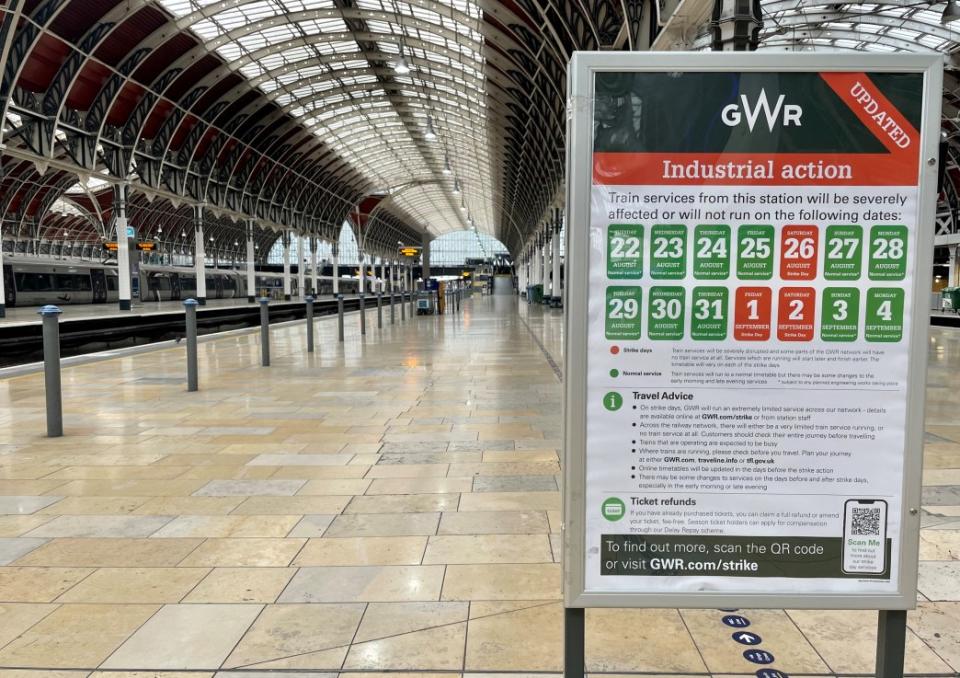London train strikes: Everything you need to know ahead of May bank holiday week disruption

Brits can expect significant rail travel disruption over the May bank holiday week as train drivers stage another wave of strikes in a long-running dispute over pay and conditions.
Members of the Aslef union will walk out at 16 rail operators between 7 and 9 May. There will also be a ban on overtime working between the Bank Holiday Monday on 6 May and 11 May.
Days affected by full train strikes will see services brought to a near standstill. Rail services that are working will typically only run between 7.30am and 6.30pm and will be significantly reduced.
The overtime ban will also reduce services significantly, with some cancellations expected. Check the National Rail website before you travel for more details.
An overtime ban from customer service managers of the TSSA is also causing disruption on the London Underground, after strikes closed some stations in April.
Strike dates
Tuesday, 7 May: Greater Anglia, Great Northern Thameslink, c2c, Southeastern, Southern, Gatwick Express and South Western Railway.
Wednesday, 8 May: Avanti West Coast, CrossCountry, East Midlands Railway, Chiltern Railways, Great Western Railway and West Midlands Trains.
Thursday, 9 May: LNER, Transpennine Express and Northern Trains.
Monday, 6 May to 11 May: Overtime ban
What do the key players say?
Aslef, which represents around 96 per cent of UK train drivers, argues its members haven’t had a pay rise in five years. Talks between union officials and the government have been non-existent since December 2022.
Aslef, led by general secretary Mick Whelan, rejected a two-year offer of a 4 per cent below-inflation pay rise earlier this year.
Its members are also furious at new legislation which enforces a minimum level of service on strike days. They voted overwhelmingly to continue striking in February.
A spokesman for the Rail Delivery Group (RDG), which represents UK train companies, said: “The rail industry is working hard to keep trains running but it is likely that services on some lines will be affected on the evening before and morning after each strike between May 7 and May 9 because many trains will not be in the right depots to start services the following day.
“Customers should also be aware of Network Rail’s engineering works which will take place this coming early May Bank Holiday. Those customers planning to travel around Cambridge, Liverpool and between Birmingham Airport and Rugby/Leamington Spa should check their journeys before setting off.
“We can only apologise to our customers for this wholly unnecessary strike action called by the Aslef leadership which will sadly disrupt journeys once again.
“It will also inflict further damage on an industry that is receiving up to an additional £54m a week in taxpayer cash to keep services running, following the Covid downturn.”
Aslef’s Whelan said: “It is now a year since we sat in a room with the train companies – and a year since we rejected the risible offer they made and which they admitted, privately, was designed to be rejected.”
A Department for Transport spokesperson said: “Aslef is the only rail union continuing to strike, targeting passengers and preventing their own members from voting on the pay offer that remains on the table.
“Having resolved disputes with all other rail unions, the transport secretary and rail minister have ensured that a pay offer is on the table —‚ taking train drivers’ average salaries from £60,000 up to £65,000.”
Don’t forget the tube strikes
The London Underground has faced threats of industrial action from the Rail, Maritime and Transport (RMT) union throughout this year.
So far, planned walkouts have been called off at the eleventh hour after intense backroom discussions between Transport for London (TfL) and union officials. London Mayor Sadiq Khan was able to drum up £33m to pay off the unions in January.
However, there is ongoing industrial action by the lesser-known TSSA union, which represents customer service managers.
Strikes on 10 and 26 April closed a number of tube stations at very short notice and an overtime ban is set to continue until 5 May.
TSSA General Secretary Maryam Eslamdoust said last week: “London Underground must now come clean with the public – their refusal to negotiate seriously and fairly with our union will lead to stations closing at the last minute and other stations being understaffed.
“We have made it clear that our union will not accept the continued threats to our members’ roles, locations, terms, and conditions to stand unchallenged. We will continue to take sustained action until London Underground is prepared to negotiate with us in good faith.”

 Yahoo Finance
Yahoo Finance 